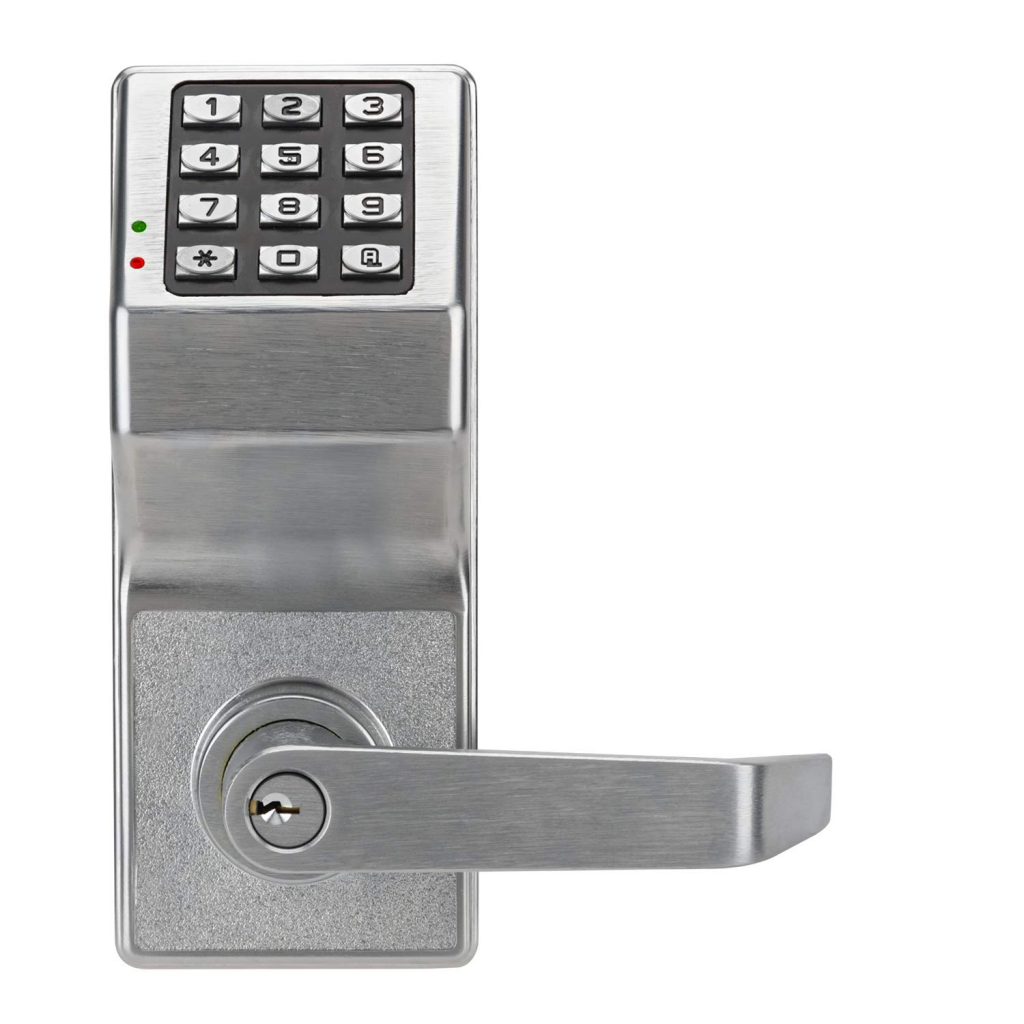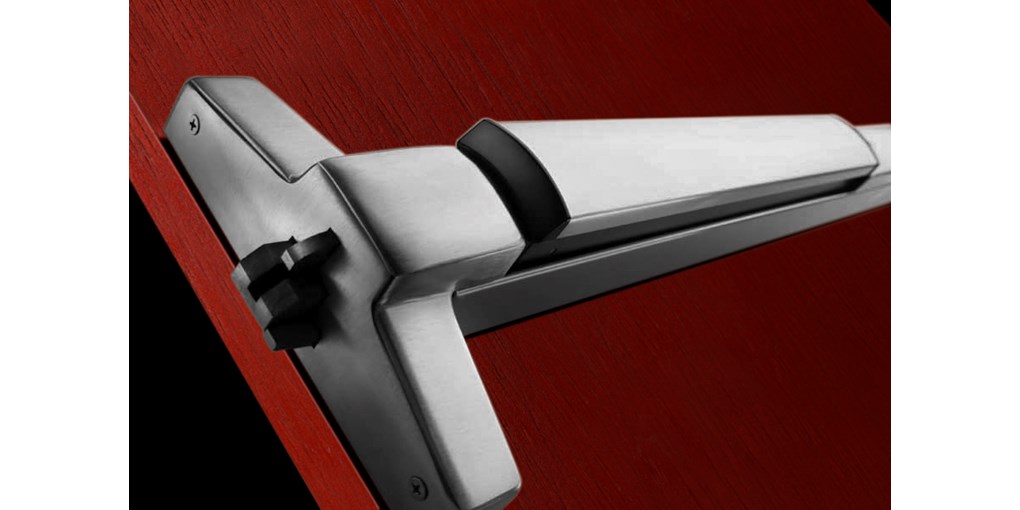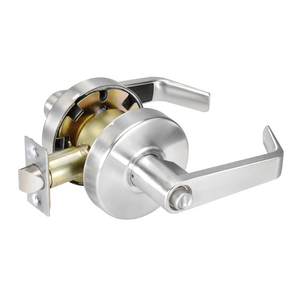If you’ve kept up with our blog, you know that we’ve delivered complete security integration for the past 35 years. Our products include all manner of both mechanical and electronic security equipment. However, we often surprise customers when we tell them that our company started as a locksmith shop. Before delving into the technology that we regularly discuss in this space, the company started as a strictly mechanical shop dealing with all manners of door hardware and keys. As such, we’ve gained well-earned expertise in this area. This allows us to give our customers the best door and lock hardware for each and every application. In this post, we focus on showing you the many mechanical commerical door hardware options for your business.
First, we’ll explain some of the important differences between residential and commercial door hardware. This will go a long way towards understanding the rest of the material in this post. From there, we’ll look at both interior and exterior door hardware options. These explanations will include both legal and functional explanations of why we install specific locks on certain doors. Then, we will look at how these locks can function for you. We have several options for how your locking hardware interacts with the doors on which we install them. Now, let’s dive in with a look at the uniqueness of commercial door hardware!
What Makes Commercial Door Hardware Unique?
Commercial door hardware has a couple features that make it unique from its residential counterpart. For starters, commercial doors receive much more use than your doors at home. Additionally, doors in businesses generally prove weightier and sturdier than residential doors. For these reasons, we must provide higher-quality hardare, with much more durability, than we must provide for homes. Unfortunately, maintenance staff at businesses often use cheaper, residential-grade locking equipment on doors at their place of employment. This can lead to a loss of security, as well as a frustrating user experience as this hardware fails quite quickly after installation.
Moreover, commercial security also has legal guidelines that we must follow when installing locks in businesses. While homeowners can install whatever locks they choose, we cannot say the same for business owners. Instead, we must take fire codes and other legal guidelines into consideration when choosing locks for your business. Fortunately for you, locksmiths such as ourselves know these guidelines inside and out. This means that when you call us, you know the commercial door hardware options we present will meet any and all legal standards for the purpose we install them for. Now, let’s turn our attention to some specific interior door hardware options for commercial spaces.

Standalone keypad levers, such as this one by Trilogy, give business owners both door security as well as an element of key control.
Interior Door Hardware Options
When it comes to securing your business, interior locks serve an important purpose. Interior lock security can help keep offices, supply and server closets, and other rooms and spaces “off limits” to many employees secure. However, we must do so with a couple important guidelines in place. For starters, we must follow Massachusetts Fire Code, based on standards put forth by the National Fire Protection Association (or “NFPA”). The specific code these guidelines are based on is called “NFPA 1.” This code creates legal guidelines for locks that we can install that do not hinder fire security. For example, we cannot install deadbolts in commercial spaces, as deadbolts can block one’s escape from a burning building. For this reason, we must make sure that we install commercial lock equipment that resides in the handle of the door itself.
Furthermore, we must also follow legal guidelines contained within the Americans with Disabilities Act (or “ADA”). This Act, passed in 1990, helped create many commercial lock requirements. Congress passed this law in order to ensure universal access to commercial buildings. In particular, this act rules that installing doorknobs in commercial spaces can hinder handicapped people from freely operating doors.
Given these two guidelines, we generally install levers with locking hardware on interior commercial doors. This setup meets both fire safety and ADA-compliance standards. If we wish to create extra security, we can install a keypad lever, such as the one pictured. These levers create both key control security and door security. We will get further into potential locking options for these levers in a bit. For now, let’s turn our attention to exterior commercial door harware options for your business.
Exterior Door Options
For many of your business’s exterior doors, we can install the same types of levers we’d install on interior doors. However, state fire code does have a major exception for any doors marked with an “Exit” sign in your business. Rather than installing a lever on these doors, we must install hardware providing “single-motion egress” instead. This involves installing an exit device that allows you to exit the building without grabbing onto a hot lever during a fire. In most cases, we install a “crash bar,” such as the one pictured here.

Many doors in a business require a crash bar, such as this model by Corbin Russwin, to provide quick escape in the case of a fire.
Of course, crash bars only represent the door hardware on the inside of the doors we place them on. On the exterior-facing side, we have a few options for door hardware. For starters, some exterior doors may have no hardware on the outside! This setup provides effective security for doors that nobody should ever use to enter a building. Additionally, we can install cylinders with pull plates that users can operate with a key for occasional use. Finally, we can also install a lever that connects to the crash bar, known as a “lever trim,” to allow for regular use from the outside. We install this trim on commonly-used exit doors that people use on a regular basis. Now that we have the basics of interior and exterior hardware options, let’s review your options for deciding how this hardware operates.
Door Function Options for Your Commercial Space
When we refer to the “function” of a lock, we are referring to the way that users must interact with the hardware to open a door. For example, some levers and lever trims operate freely at all times, without the option to use a key or lock the door at all. We refer to this option as a “passage” function. This door hardware works well on doors that must be closed at times, but don’t require the security of locks. Interior doors that open into common hallways and closets make great spots for hardware with this function.
“Privacy” function levers also do not require a key to operate them. However, they do have a button on the inside that someone in a room can activate to lock out those on the outside of the door. However, operating the handle from the inside will always open the door and “pop” the button back to its unlocked position. We mainly install privacy function hardware in restrooms.

Privacy function locks, such as this Yale model, generally lock with the push of a button located on the inside of the lever.
Finally, we also have a couple functions for doors that do require keys. “Entrance” function hardware represents the most popular of these. This function allows the first person in to use their key to unlock the door. At that point, it can stay unlocked until someone uses either a key or a thumbturn on the inside of the lever to re-lock it. For those that desire more security, we install “storeroom” function levers. This function requires the use of a key to open it at all times, with no option to keep the door unlocked. We install these levers in prioritized areas that should remain secured at all times. As you see, choosing the right function can prove as important a security measure as selecting the right door hardware!
Choosing the Commercial Door Hardware Options That Work for You
We hope that this post helps you find the commercial door hardware options that best fit your security needs. Moreover, we invite you to contact us with any questions this post may raise for you. We’ve worked with hundreds of customers to outfit them with the security and functionality they need from their locks, while also adhering to any potential legal requirements involved. Furthermore, we also encourage you to take advantage of of our free site survey program. We offer complimentary security audits and equipment quotes to both new and existing customers alike. While on site, we can address any door security concerns you may have. Additionally, we can also make suggestions of our own based on observations made during our visit. Together, we can create a complete system of door hardware for your commercial space that fits your security needs!
